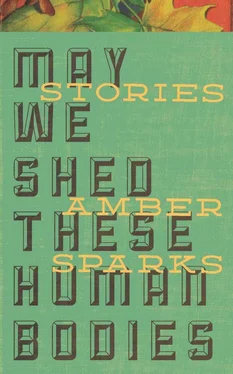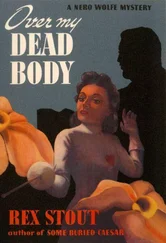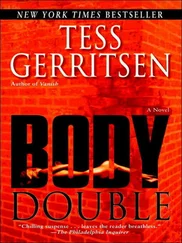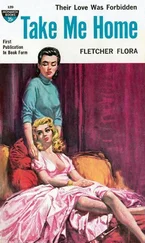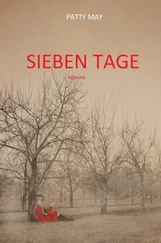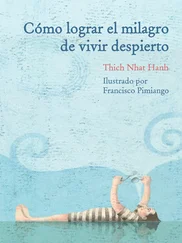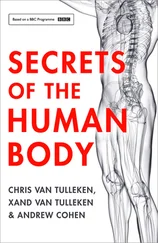Amber Sparks - May We Shed These Human Bodies
Здесь есть возможность читать онлайн «Amber Sparks - May We Shed These Human Bodies» весь текст электронной книги совершенно бесплатно (целиком полную версию без сокращений). В некоторых случаях можно слушать аудио, скачать через торрент в формате fb2 и присутствует краткое содержание. Год выпуска: 2012, Издательство: Curbside Splendor Publishing Inc., Жанр: Современная проза, на английском языке. Описание произведения, (предисловие) а так же отзывы посетителей доступны на портале библиотеки ЛибКат.
- Название:May We Shed These Human Bodies
- Автор:
- Издательство:Curbside Splendor Publishing Inc.
- Жанр:
- Год:2012
- ISBN:нет данных
- Рейтинг книги:5 / 5. Голосов: 1
-
Избранное:Добавить в избранное
- Отзывы:
-
Ваша оценка:
- 100
- 1
- 2
- 3
- 4
- 5
May We Shed These Human Bodies: краткое содержание, описание и аннотация
Предлагаем к чтению аннотацию, описание, краткое содержание или предисловие (зависит от того, что написал сам автор книги «May We Shed These Human Bodies»). Если вы не нашли необходимую информацию о книге — напишите в комментариях, мы постараемся отыскать её.
May We Shed These Human Bodies peers through vast spaces and skies with the world's most powerful telescope to find humanity: wild and bright and hard as diamonds.
May We Shed These Human Bodies — читать онлайн бесплатно полную книгу (весь текст) целиком
Ниже представлен текст книги, разбитый по страницам. Система сохранения места последней прочитанной страницы, позволяет с удобством читать онлайн бесплатно книгу «May We Shed These Human Bodies», без необходимости каждый раз заново искать на чём Вы остановились. Поставьте закладку, и сможете в любой момент перейти на страницу, на которой закончили чтение.
Интервал:
Закладка:
As They Always Are
The mother was the mother in a time before drugs could save you from the small things. It was the small things that always got them, in the time before, and the mother’s death was no different. She cut her hand on a nail, or maybe a piece of glass, or maybe the edge of the bread knife; it doesn’t really matter. The end result was septicemia, which sounds pretty as a woman’s name but means poison in the blood. The end result was fever, was the loss of a hand, was organ failure. The end result was death.
The mother was called the mother for a reason; the mother had a baby not long before she hurt her hand. The baby was still very new and very pink. He had greedy eyes and hungry teeth, hard and sharp as diamonds. The baby’s teeth would latch into the mother’s breast like tiny hooks as he fed, and when at last he ripped them free her nipples would weep blood along with milk. A dark red ring soon marked all of her blouses. The mother didn't mind, though. The mother was kind and beautiful, as the mother always is. Her hair was the color of lemons and her eyes were the color of polished steel, and the kindness in her glowed so fiercely and brightly that she could barely feel the baby’s bite. Her love for the baby blocked all of the pain and the hurt and the sadness in the world.
So when the mother died, the father could find no one to feed the baby. He hired wet nurses, but the baby wouldn't take their milk, and they wouldn’t take the baby’s teeth. An unsentimental man, as the father always is, he married the upstairs maid — a very young woman who slept in his bed even before the mother died. The maid had no better luck than the wet nurses. Angry at her failure, she told the father his son was a demon and that she would have nothing to do it. The father tried to feed him from a bottle, tried cow’s milk and goat’s milk and sheep’s milk, but to no avail. The baby just would not eat.
Yet, though the baby did not eat, he did not starve. His cheeks grew pinker and fatter, his head grew bigger, his greedy eyes grew brighter. He laughed and clapped his fat hands and cooed in his cradle.
You see, said the father’s new wife, he is a demon child. How can he still grow and clap his hands when he has taken no milk for months? How can he laugh when he should have starved to death weeks ago?
I am troubled, the father admitted. I do not know how to answer these questions, and I am greatly troubled.
The father’s new wife crossed her arms over her lovely white chest, which hid a heart grown narrow and choked with hate. Her hair was black as a moonless night, and her eyes were cold coals. It’s a demon child, she repeated.
She was proud and beautiful, yes, but as false and cold as the mother had been warm and true. She was the mother's inverse, the far-flung other. The stepmother. And being what the stepmother always is, she decided to sneak and creep about at night, to spy and sit in shadows and find out who or what was feeding the baby. She meant to rid herself of the first wife’s baby by proving him unholy, unnatural.
The stepmother was thin and small, and so easily hid herself behind the baby’s bassinet to keep watch one night. She watched and she waited, until the moon was high and the baby began to whimper, and the curtains blew soft kisses to the rocking chair and the changing table. The warm breeze chilled her heart. She pulled her cloak tighter and then froze as something entered the room through the window; she sighed and relaxed when she saw it was only a small black cat. But no ordinary cat, she realized at once. The cat leapt to the top of the bassinet and whispered to the baby, its voice a string of whistling sibilants. Hush, child, it said. She is coming soon.
Then the child hushed, and the black cat hopped onto the windowsill and vanished out the window.
The stepmother hid her face in her hair, shivering now despite the warmth. She told herself that she had been sleeping, that she had dreamed the black cat; she pinched her thin skin and knew she was not sleeping. Scared, she started to rise and was stopped by the baby’s cry and then a scraping sound at the window — another cat, one that leapt onto the baby’s bassinet just like the first. This cat was white as snow, and its voice was a quiet, purring hum. Hush, my little one, it said. She is coming sooner.
Then the little one hushed, and the white cat hopped onto the windowsill and vanished out the window.
The stepmother shivered harder than ever now, and knew that she had not slept or dreamed. She was afraid, but not cowardly, and so she stayed to hear the baby cry once more. Instantly a third cat, a spotted tabby this time, leapt onto the bassinet and spoke in a voice like rustling leaves. Hush, sweet baby, it said. She is here.
And with a rush of warm wind, the dead mother appeared. She was white and translucent as rice paper and still clad in her funeral gown. But her kindness glowed more fiercely in death than in life, and the tabby cat rubbed its head against her ghostly ankles as she gently picked up the baby and sat in the rocking chair. The chair did not move, did not creak as the dead mother rocked back and forth with her baby at her breast. The sad sight would have moved almost anyone to pity, but the stepmother felt only anger burning in her throat as she watched the baby drowsily feed. She cried out, stood but could not speak through her rage, and the dead mother turned in surprise. The stepmother could see the blurred outlines of the curtains blowing right through the dead woman. The mother sighed, placed the baby back in his bassinet, and kissed him once, very softly, on his tiny forehead. Then she stared at the stepmother for a very long time before speaking.
No mortal should have seen me, she finally said in a voice like the faintest far-off stars. You’ve killed him now, you know. But, she said, and pointed at the stepmother, I'll make sure you're worse than dead by morning. Then without another word, she vanished out the window with the warm breeze. The tabby cat stayed behind. It tilted its head and looked up at the stepmother, its tail swishing back and forth. Then, in a quick flicker of movement, it pounced.
When the sun rose, the baby’s nursemaid came to check on him as she did every morning. She found him lying on his back, eyes open and quite dead. All the fatness and pinkness had gone from him; he looked as though he'd starved to death. The window was open and the room was quite cool — and yet a strange, warm breeze seemed to linger there, caressing the cheek of the weeping nursemaid.
The stepmother, it was discovered, had disappeared and could not be found. However, a strange stain, black as a moonless night and cold to the touch, was discovered on the nursery floor behind the bassinet that day. Nothing could ever lift that spot from the floorboards, no matter how the maids might scrub and scrape. It seemed determined to stick to the floor forever. It was hardly important, though, as the stain was quite small and a rug was quickly found to keep it out of sight.
When Your Carcass Hits the Canvass
In this corner: It’s the Fat Asshole! But he’s moving fast, stomach spilling over the jerking, kicking body as he lunges forward, tries to pry open the foamy jaws.
And in this corner: It's the Hunted Man! The scrawny disappearing act with a white pill in his back pocket and his face all covered in glare. But underneath the nerves: his body one tight nerve strung too tight, strung to snap. He's hard to corner. Hard to pin down.
In-fighter versus out-fighter. Speed and strategy versus power, versus chin. It's a goddamned fight we've got here, folks. Until someone goes down for good. Until someone smiles real bloody for the cameras.
Читать дальшеИнтервал:
Закладка:
Похожие книги на «May We Shed These Human Bodies»
Представляем Вашему вниманию похожие книги на «May We Shed These Human Bodies» списком для выбора. Мы отобрали схожую по названию и смыслу литературу в надежде предоставить читателям больше вариантов отыскать новые, интересные, ещё непрочитанные произведения.
Обсуждение, отзывы о книге «May We Shed These Human Bodies» и просто собственные мнения читателей. Оставьте ваши комментарии, напишите, что Вы думаете о произведении, его смысле или главных героях. Укажите что конкретно понравилось, а что нет, и почему Вы так считаете.
